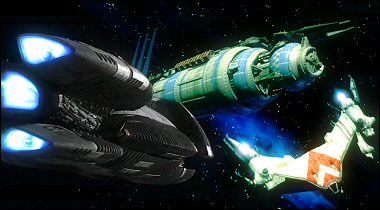 After seeing the news that Christopher Franke will be scoring new Babylon 5 adventures for the first time in nearly five years, I’m looking forward to the upcoming direct-to-DVD anthology Babylon 5: The Lost Tales a little bit more. But something has been nagging in the back of my head about this project almost from the first announcement. And finally, I think I know what it is.
After seeing the news that Christopher Franke will be scoring new Babylon 5 adventures for the first time in nearly five years, I’m looking forward to the upcoming direct-to-DVD anthology Babylon 5: The Lost Tales a little bit more. But something has been nagging in the back of my head about this project almost from the first announcement. And finally, I think I know what it is.
To start off, I’m going to need to see a DVD of brand new B5 in my hot little hands before I believe it. We’ve had a B5 movie that was deep into pre-production get scuttled, we’ve had a new PC game with full-motion, shot-on-the-soundstages footage with Bruce Boxleitner and Mira Furlan get scuttled, we’ve had a pilot for a new series come and go without and order, and we’ve had the crushing disappointment of Crusade getting yanked. Babylon 5 may have dodged bullets left and right during its years on the air, but ever since Sleeping In Light, the attempts to keep the franchise going have resulted in a string of disappointments and near-misses that you could almost make a drinking game out of. So, composers signing on the dotted line or no, I’ll believe The Lost Tales when I see ’em.
But that isn’t even the big thing that’s bugging me.
I put this question to you for discussion: Can new Babylon 5 adventures be relevant in a Battlestar Galactica world?
So much has happened since Babylon 5 was on the air as a series, both on television and off. In its heyday, B5 stole the Star Trek spinoffs’ crown as the quintessential SF TV show exploring the human condition through the lenses of beliefs, politics, philosophies, ethics and current/recent events. I forget if it was Peter David or David Gerrold who said, in Trek’s waning days (i.e. Enterprise), that the Star Trek franchise was no longer telling stories about those things, but was just eating its own tail and telling stories about the minutiae of the Star Trek universe. (I’m almost sure it was Gerrold.) But the problem now is that, unless there are some radical shifts in tone and style, Babylon 5 could become the same thing when it returns.
Besides, if you ask anyone what today’s quintessential SF TV show exploring the human condition through the lenses of beliefs, politics, philosophies, ethics and current/recent events is, I don’t think anyone’s going to even hesitate to say Battlestar Galactica. The whole re-genesis of Galactica was filtered through the post-9/11 mindset from its conception, so it would almost have to try very hard not to be about current events. As some of the best hours of Babylon 5 (and, indeed, the original Star Trek) did, the new Galactica offers no easy answers, and its characters give no ground in the name of Making Them More Palatable To The Audience.
And then there’s the device of the story arc. When Babylon 5 premiered, Warner Bros. execs balked at the notion that an audience would stick with a five-year “television novel” – it had never been done before, and surely it would never work.
These days, we get story arcs so densely layered and unforgivingly inscrutible that Babylon 5, with its frequent “white-flash-to-B&W-footage-from-previous-episodes” flashbacks, almost seems like an uncertain dummy run at a story arc. Babylon 5 would hand big chunks of some pivotal episodes over to flashbacks to help clue viewers in; ever since Buffy and Angel, the standard operating procedure now is to do that at the beginning of the show after someone says “Previously, on…”, and anyone who missed that recap at the beginning of the show is just out of luck. If there’s a recap at all.
And look at the sheer number of densely-plotted story arc shows on the tube these days: Lost, Galactica, The Nine, Prison Break, Heroes, Jericho…the list goes on an on. And those are just the ones that are on the air in the current season, never mind shows like Threshold, Invasion and so on that have fallen by the wayside when their ongoing stories apparently didn’t spark enough interest for audiences to follow them.
So now that its biggest innovations – CGI effects instead of traditional model work, involved story arcs, virtual sets – have become de rigeur not just for SF TV, but for a lot of non-genre TV as well…what can Babylon 5 bring to the table? Straczynski is already making it very clear that he wants to redraw some of the universe’s stylistic boundaries and find a new way to shoot B5. But is that the only place where his well-loved universe will need some tweaking to find an audience today? Or is the direct-to-DVD format of the new stories a hint that a new audience isn’t being sought, and that these Lost Tales are just a new offering to the faithful?

Skip to content
Being the blog of theLogBook.com's webmaster, Earl Green
You May Also Like:
Categories
Uah
Categories
Fishin’ reaction
Categories
It is done
Categories
Sister vs. sister
Categories
Happy 8-bit Mother’s Day!
Categories

I think you give all of these shows far too much credit. Babylon 5 may have carried a certain cache with the uber-geeks, but it never really entered the mainstream. And no matter how many covers of the significantly downsized (though larger) TV Guides it gets, the new BattleStar Galactica will not make the general public forget Dirk Benedict. These shows simply play to a much smaller audience.
And, as you say, these shows are all densly plotted, making entry into the series almost impossible after the initial launch. What went wrong with ‘Star Trek’ is that it tried to play that game (to appeal to the hardcore) and forgot what made it the biggest Sci-Fi series in the world (playing to the mass audience).
X-Files fans were fanatical and who thinks of that show these days? Buffy is already fading into nostalgia. The fact that you, of all people, have doubts as to the usefulness of new B5 just points to the notion that these “innovative” series are flashes in the pan, no matter how long that flash takes to burn out. If people are already able to move on from B5, who’s going to remember the new Battlestar Galactica five years after it goes off the air? They lack the longevity of the original Star Trek and, no matter how the producers squandered its legacy, these new series are but drops in the ocean compared to it.
(I’ll save for another day the issue as to whether Star Trek’s vaunted “social relevancy” indeed has much to do with it’s legacy. Take a look at the most popular episodes and you’ll see a dearth of “relevant” episodes.)
The big-picture longevity of B5 or BSG isn’t even remotely what I’m talking about here, though – that’s a whole different discussion, one in which very, very few shows would stand as anything but a product of their times.
And after two season of seeing how very Buffy-influenced the revived Doctor Who is, even though I wasn’t really a Buffy fan (and only marginally more of an Angel fan), I’m not quite so ready to discount Buffy. I think when the book is written on 90s SFTV, the list of most influential shows will probably go: Buffy, Xena, Babylon 5 (perhaps if only for putting TV CGI on the map), X-Files, Twin Peaks. (I tend to consider Farscape a product of this decade, not the last – if anyone’s wondering – and in any case, I’m not sure what innovations it really exposed us to, aside from a great cast.)
Anyway, to stray somewhat closer to the original point: the question I’m really trying to explore here is whether or not, in 2007, Babylon 5 can reclaim even a fraction of its glory in a world where most of the critics seem to think the new Galactica is the bee’s knees. Even though B5 explored issues such as patriotism vs. jingoism, genocide, ethics in wartime, and so on, it just seems in retrospect to lack the “oomph” with which the current incarnation of Galactica endows the same topics today. I’m wondering how, or if, Babylon 5 can reclaim any of that ground. (Admittedly, I suppose my framing of the question exposes my own viewpoint to be one of doubtfulness.)
There are two things that I think separate B5 from BSG and suggest that there’s still a niche for it, assuming the quality is up to snuff.
First is that the tones of the shows are very different. B5 is ultimately a very optimistic show about the power of individuals to remake the world for the better. I’m not going to say BSG is more cynical, but its victories are the small victories people find hope in even when the world continues going from bad to worse at an astonishing clip.
More importantly, BSG is very much a show of its time. From the clear 9/11 references to the questions about torture in season 1 to the examination of occupation in the current season, you can almsot say that BSG is as “ripped from the headlines” as Law and Order. B5 made more wide-ranging historical allusions – it was not as specific to a particular moment, but rather it seemed to be saying, “Yep, here we are in the future, making the same dumb mistakes we’ve always made.” The connections to the present weren’t as obvious, which may be one reason they lack the oomph that Earl mentions. On the other hand, it does say something for Straczynski that he wanted to talk about these things in the early 90s. And maybe he has some things to say now that we’ll look back on in 2016 and say, “Boy, he sure called that one.”
In a way, I guess I’m saying that B5 can maintain its relevance by not trying too hard to be relevant.
That’s a good point. The most relevant themes are the ones that are universal and not tied to a particular time. For instance, no matter how historic and important it is, “All In The Family” lacks something when watched today because it is so tightly tied to the politics and ideas of the 1970s. It can still be entertaining, but in a “period piece” kind of way. That’s certainly what I think will become of the current BG. The original Star Trek, on the other hand, was much less concerned with current events, so has more staying power.